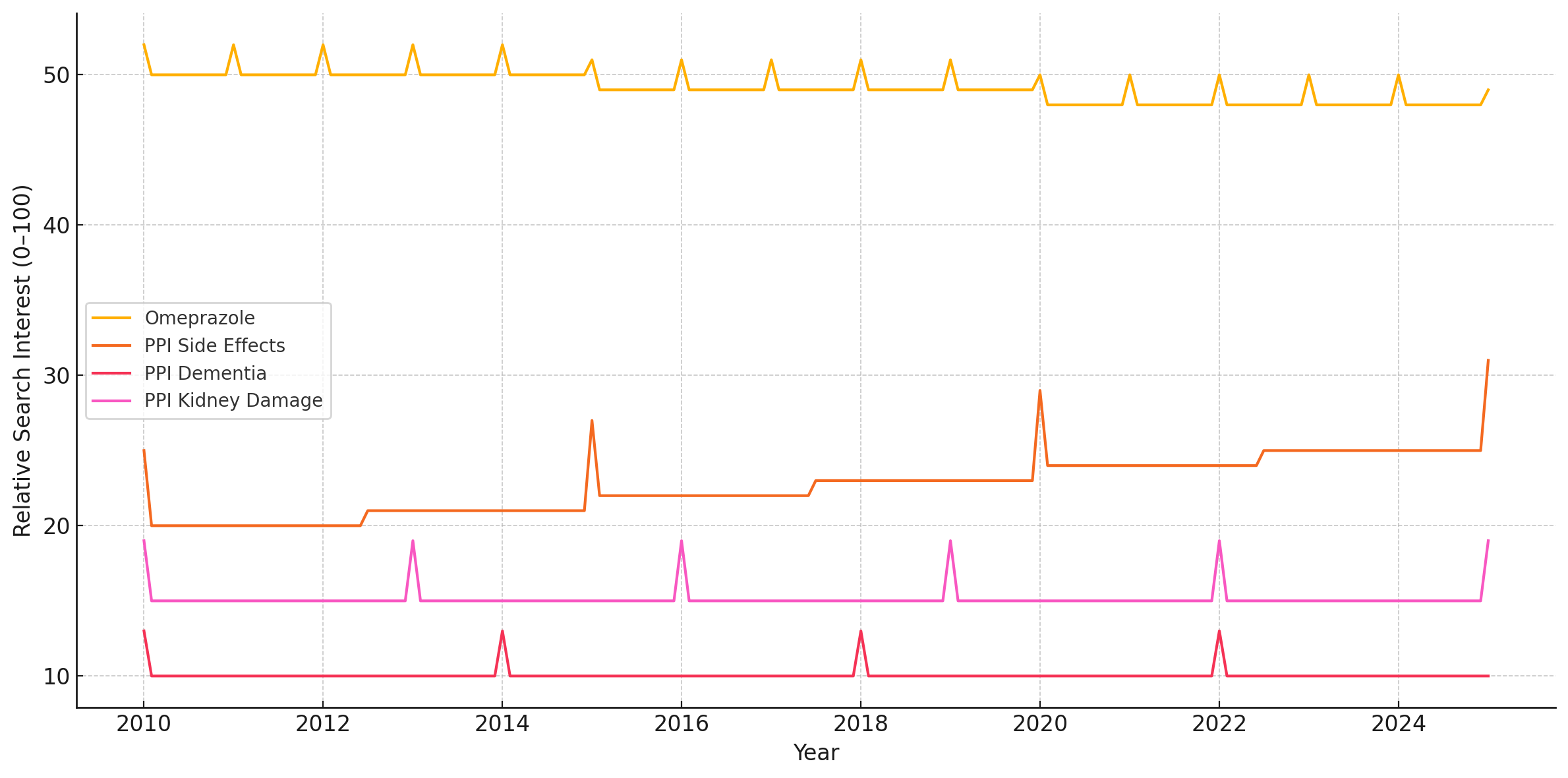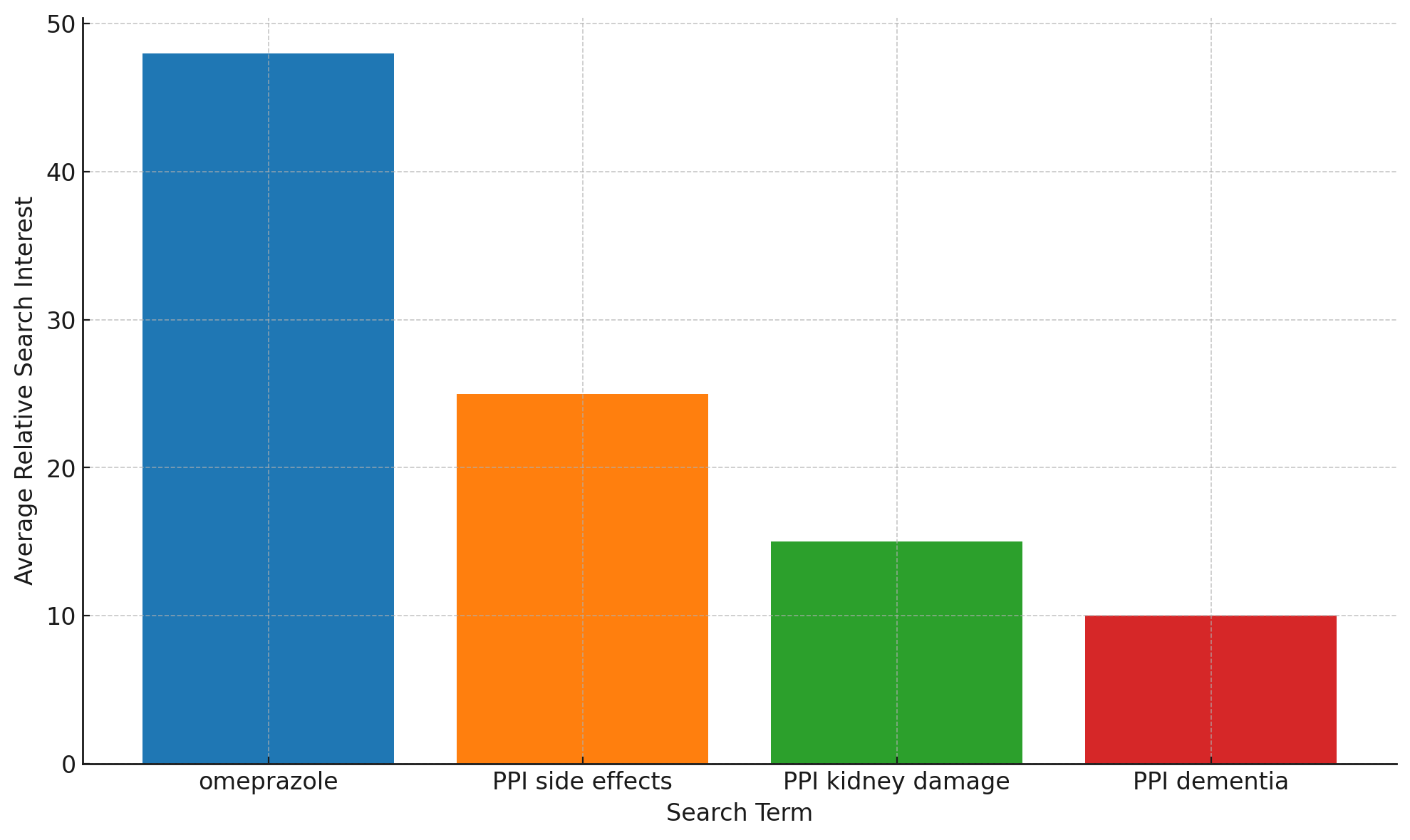Monday Poster Session
Category: Esophagus
P2759 - Public Interest in Proton Pump Inhibitor Safety: A 15-Year Google Trends Analysis (2010-2025)
Monday, October 27, 2025
10:30 AM - 4:00 PM PDT
Location: Exhibit Hall

Richeal Asante, MD
Geisinger Wyoming Valley Medical Center
Kingston, PA
Presenting Author(s)
John K. Appiah, MD1, Richeal Asante, MD2, Nikita Garg, MD1, Ewurabena N. Plange-Kaye, DDS3, Emmanuel Asare, 4
1Geisinger Wyoming Valley Medical Center, Wilkes-Barre, PA; 2Geisinger Wyoming Valley Medical Center, Kingston, PA; 3Columbia University, Dumont, NJ; 4Montefiore hospital, Bronx, NY
Introduction: Proton pump inhibitors (PPIs) are among the most commonly prescribed medications worldwide, yet emerging research has raised concerns about potential long-term adverse effects. Understanding public awareness and information-seeking behavior regarding PPI safety can inform patient education and risk communication strategies.
Methods: We extracted monthly search data from Google Trends between January 2010 and January 2025 for the United States. Search terms included "omeprazole," "PPI side effects," "PPI dementia," and "PPI kidney damage." Relative search interest was normalized on a scale from 0 to 100. Time-series analysis was performed to assess long-term trends and identify temporal spikes in public interest.
Results: Over the 181-month study period, average search interest was 49.2/100 for omeprazole, 22.6/100 for PPI side effects, 10.1/100 for PPI dementia, and 15.1/100 for PPI kidney damage. Comparing the first five years (2010–2014) to the most recent five years (2020–2024), searches for "PPI side effects" increased significantly by 19.4% (from 20.6 to 24.6; p < 0.001), while omeprazole searches declined modestly by 4.0% (from 50.1 to 48.1; p < 0.001). Interest in PPI-associated dementia and kidney damage remained stable over time. Peak search interest for side effects occurred in January 2025 (31/100). Dementia-related searches showed cyclical spikes every four years (2010, 2014, 2018, 2022), possibly reflecting the publication cycles of related research.
Discussion: Public interest in PPI safety has increased substantially over the past 15 years, with nearly a 20% rise in searches for side effect information, while maintaining stable interest in the medications themselves. This trend suggests growing health literacy and safety consciousness among PPI users. The periodic spikes in dementia-related searches align with major research publications, indicating that scientific findings influence public information-seeking behavior. These findings have important implications for patient education, shared decision-making, and risk communication strategies in clinical practice. Healthcare providers should be prepared to address evolving patient concerns about PPI safety while maintaining evidence-based prescribing practices.

Figure: Figure 1. Monthly relative search interest (scale 0–100) in the United States from January 2010 to January 2025 for the terms “omeprazole,” “PPI side effects,” “PPI dementia,” and “PPI kidney damage,” based on Google Trends data. Interest in “PPI side effects” increased over time, peaking in January 2025, while searches for “omeprazole” declined slightly. Interest in “PPI dementia” and “PPI kidney damage” remained stable, with cyclical spikes observed in dementia-related searches approximately every four years.

Figure: Figure 2. Average relative search interest (scale 0–100) for selected proton pump inhibitor (PPI)–related terms in the United States over a 15-year period (2010–2025). Omeprazole had the highest average interest (49.2), followed by PPI side effects(22.6), PPI kidney damage (15.1), and PPI dementia (10.1), reflecting varying levels of public concern and awareness.
Disclosures:
John Appiah indicated no relevant financial relationships.
Richeal Asante indicated no relevant financial relationships.
Nikita Garg indicated no relevant financial relationships.
Ewurabena Plange-Kaye indicated no relevant financial relationships.
Emmanuel Asare indicated no relevant financial relationships.
John K. Appiah, MD1, Richeal Asante, MD2, Nikita Garg, MD1, Ewurabena N. Plange-Kaye, DDS3, Emmanuel Asare, 4. P2759 - Public Interest in Proton Pump Inhibitor Safety: A 15-Year Google Trends Analysis (2010-2025), ACG 2025 Annual Scientific Meeting Abstracts. Phoenix, AZ: American College of Gastroenterology.
1Geisinger Wyoming Valley Medical Center, Wilkes-Barre, PA; 2Geisinger Wyoming Valley Medical Center, Kingston, PA; 3Columbia University, Dumont, NJ; 4Montefiore hospital, Bronx, NY
Introduction: Proton pump inhibitors (PPIs) are among the most commonly prescribed medications worldwide, yet emerging research has raised concerns about potential long-term adverse effects. Understanding public awareness and information-seeking behavior regarding PPI safety can inform patient education and risk communication strategies.
Methods: We extracted monthly search data from Google Trends between January 2010 and January 2025 for the United States. Search terms included "omeprazole," "PPI side effects," "PPI dementia," and "PPI kidney damage." Relative search interest was normalized on a scale from 0 to 100. Time-series analysis was performed to assess long-term trends and identify temporal spikes in public interest.
Results: Over the 181-month study period, average search interest was 49.2/100 for omeprazole, 22.6/100 for PPI side effects, 10.1/100 for PPI dementia, and 15.1/100 for PPI kidney damage. Comparing the first five years (2010–2014) to the most recent five years (2020–2024), searches for "PPI side effects" increased significantly by 19.4% (from 20.6 to 24.6; p < 0.001), while omeprazole searches declined modestly by 4.0% (from 50.1 to 48.1; p < 0.001). Interest in PPI-associated dementia and kidney damage remained stable over time. Peak search interest for side effects occurred in January 2025 (31/100). Dementia-related searches showed cyclical spikes every four years (2010, 2014, 2018, 2022), possibly reflecting the publication cycles of related research.
Discussion: Public interest in PPI safety has increased substantially over the past 15 years, with nearly a 20% rise in searches for side effect information, while maintaining stable interest in the medications themselves. This trend suggests growing health literacy and safety consciousness among PPI users. The periodic spikes in dementia-related searches align with major research publications, indicating that scientific findings influence public information-seeking behavior. These findings have important implications for patient education, shared decision-making, and risk communication strategies in clinical practice. Healthcare providers should be prepared to address evolving patient concerns about PPI safety while maintaining evidence-based prescribing practices.

Figure: Figure 1. Monthly relative search interest (scale 0–100) in the United States from January 2010 to January 2025 for the terms “omeprazole,” “PPI side effects,” “PPI dementia,” and “PPI kidney damage,” based on Google Trends data. Interest in “PPI side effects” increased over time, peaking in January 2025, while searches for “omeprazole” declined slightly. Interest in “PPI dementia” and “PPI kidney damage” remained stable, with cyclical spikes observed in dementia-related searches approximately every four years.

Figure: Figure 2. Average relative search interest (scale 0–100) for selected proton pump inhibitor (PPI)–related terms in the United States over a 15-year period (2010–2025). Omeprazole had the highest average interest (49.2), followed by PPI side effects(22.6), PPI kidney damage (15.1), and PPI dementia (10.1), reflecting varying levels of public concern and awareness.
Disclosures:
John Appiah indicated no relevant financial relationships.
Richeal Asante indicated no relevant financial relationships.
Nikita Garg indicated no relevant financial relationships.
Ewurabena Plange-Kaye indicated no relevant financial relationships.
Emmanuel Asare indicated no relevant financial relationships.
John K. Appiah, MD1, Richeal Asante, MD2, Nikita Garg, MD1, Ewurabena N. Plange-Kaye, DDS3, Emmanuel Asare, 4. P2759 - Public Interest in Proton Pump Inhibitor Safety: A 15-Year Google Trends Analysis (2010-2025), ACG 2025 Annual Scientific Meeting Abstracts. Phoenix, AZ: American College of Gastroenterology.
